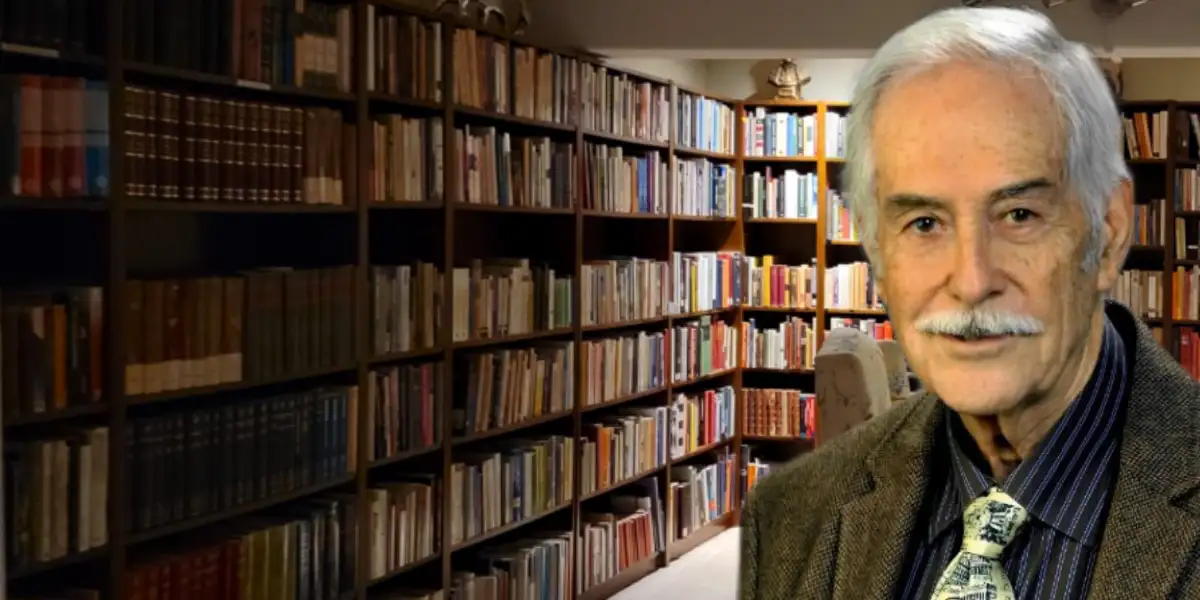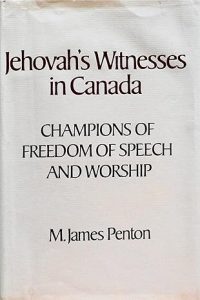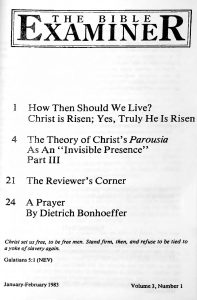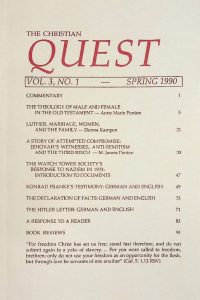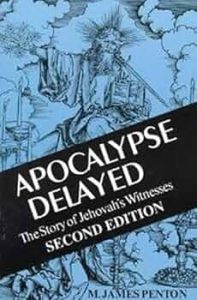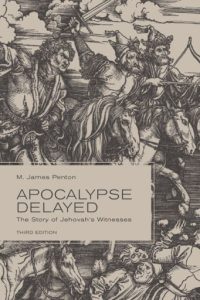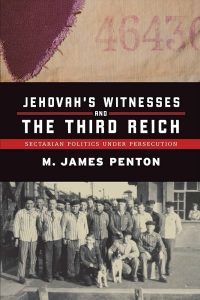Remembering James Penton
A Courageous Voice and Scholar for Former Jehovah's Witnesses
Doctor Marvin (Jim) James Penton- born in 1932, was a Canadian historian, author, and former Jehovah’s Witness when he passed away in his home in Ontario, Canada on November 4th, 2024. Jim was well known for his critical research and publications on the Jehovah’s Witnesses, explicitly examining their doctrines, history, and organizational practices. His work is highly regarded in academic and ex-member communities for its in-depth analysis and insight into the inner workings of the Jehovah’s Witnesses, mainly due to his unique perspective as a former member.
AvoidJW extends our deepest sympathy to all those Jim Penton leaves behind, especially his beloved wife, Beth; his children, David, John (Shona), and Anne (Bob); his foster daughter, Linda (Willie); as well as his eight grandchildren and eight great-grandchildren. Jim was an insightful scholar, a guiding light for former Jehovah’s Witnesses, and a devoted husband, father, and friend. His compassion, wisdom, and dedication to truth impacted countless lives. We remember him fondly for his courage, kindness, and unwavering commitment to those who needed it most. His legacy will endure, and he will be profoundly missed.
The History on Penton
Penton grew up in a family with a long history in the Jehovah’s Witnesses, his grandfather being a Witness in the early 20th century. As a third-generation witness, Penton served as an elder- a leadership position within the Jehovah’s Witnesses and was a committed member, adhering closely to the group’s teachings and beliefs. This was until the 1970s when he questioned some of the Jehovah’s Witnesses’ doctrines and practices. Below, you will find his writings in favor of Jehovah’s Witnesses, and then he began writing his truths as doubts grew, examining the group’s history and organizational policies he found troubling, especially regarding issues like doctrinal inconsistencies, control over members’ lives, and the organization’s handling of dissent. He became increasingly critical of the Watch Tower Bible and Tract Society (the legal and corporate arm of the Jehovah’s Witnesses), which led to tension between him and the organization. One of Penton’s significant points of contention was the Jehovah’s Witnesses’ stance on neutrality and political engagement. He argued that their interpretation and application of this doctrine were inconsistent and that the organization’s policies were often contradictory, which, in his view, undermined its credibility.
Eventually, Penton was disfellowshipped (excommunicated) by the Jehovah’s Witnesses in 1981 for his outspoken views and criticisms, as what the organization calls apostasy. This experience further motivated him to research and write about the organization, leading to his decision to document what he considered to be the problematic aspects of the Jehovah’s Witnesses in his publications. Below are the books Penton had published regarding Jehovah’s Witnesses.
Jehovah's Witnesses in Canada:
Champions of Freedom of Speech and Worship - Published 1976
Penton wrote this book while he was still a Jehovah’s Witness. When his friend and advocate recently asked him about it, he said it was a good book, but there are parts that he would have changed and that if he had the time, he would go back and rewrite it. It explores the complex relationship between Jehovah’s Witnesses and Canadian society, especially when the group faced significant legal challenges and public opposition. Penton examined how Jehovah’s Witnesses in Canada endured persecution, including arrests, social stigma, and legal restrictions, particularly during times of war. This history is especially important in understanding how the Witnesses had become known for their staunch defense of civil liberties in North America, even though they are often at odds with mainstream culture and governments.
Critical Points in Jehovah’s Witnesses in Canada:
- Persecution in WWII: Jehovah’s Witnesses faced arrests and harassment in Canada for their pacifism and refusal to salute national symbols, sparking legal battles that influenced Canadian civil rights.
- Freedom of Speech and Religion: Witnesses fought landmark Supreme Court cases that advanced Canadian freedoms of speech and religion, setting important legal precedents.
- Impact on Civil Rights: Despite their marginal status, Jehovah’s Witnesses significantly expanded civil liberties in Canada.
- Internal Contradictions: Penton critiques the group for promoting freedom publicly while limiting it within their own ranks, discouraging dissent and free expression among members.
The Bible Examiner and The Christian Quest - Published 1983, 1990
Penton stands out as one of the first Jehovah’s Witnesses to document his discoveries after leaving the faith. In the late 1980s and early 1990s, he wrote many essays and magazines regarding Jehovah’s Witnesses. He also collaborated with his friends Carl Olaf Jonsson and Rud Persson to publish two magazines: The Christian Quest and The Bible Examiner. The Bible Examiner was published from July 1981 to January/February 1983. The Christian Quest became part of Penton’s last book, Jehovah’s Witnesses and the Third Reich. These publications explored the doctrinal histories and scriptural studies on various topics. Penton, Jonsson, and Persson maintained regular communication and cherished a lifelong friendship until Penton’s passing.
Apocalypse Delayed: The Story of Jehovah's Witnesses -1st addition published 1985, 2nd 1997, 3rd 2015
This is Penton’s most well-known work, offering a comprehensive history and analysis of the Jehovah’s Witnesses. The 3 additions examine the organization’s origins, development, and unique teachings, focusing on its apocalyptic beliefs and predictions. Penton critiques the leadership’s repeated claims about the end of the world and the resulting psychological impact on members. The book resonates strongly with many former Jehovah’s Witnesses because it provides a thorough, critical, and well-researched exploration of the history, doctrines, and organizational practices of the Watch Tower Society (the legal organization behind Jehovah’s Witnesses).
Critical Points in Apocalypse Delayed:
- Detailed History of the Organization: Many former Jehovah’s Witnesses are not aware of the complete history of the organization while they were members, as the Watch Tower Society controls the narrative that members are allowed to access. Apocalypse Delayed first addition goes back to the religion’s beginnings in the late 19th century under Charles Taze Russell and traces its development through the leadership of Joseph Rutherford and beyond. This historical depth helps ex-members contextualize their experiences and understand how the organization’s doctrines and practices evolved.
- Explaining Doctrinal Changes: in the second edition, Penton highlights the many shifts in doctrine and the organization’s repeated predictions of the end of the world, which were central to Jehovah’s Witnesses’ teachings but often proved wrong. For example, the Witnesses set specific dates (such as 1914, 1925, and 1975) for the end of the world, only to later reinterpret or abandon these predictions. Many former members felt betrayed or confused by these doctrinal shifts. Penton’s book addresses these inconsistencies, providing a comprehensive analysis of how and why these changes occurred, which helps former members make sense of the cognitive dissonance they may have felt.
- Insight on Control mechanisms in the Organization: The third addition explores the Watch Tower Society’s use of social control to maintain loyalty and conformity among its members. This includes mechanisms like disfellowshipping (shunning), restrictions on independent thinking, and strict behavioral standards. For many former Jehovah’s Witnesses, reading Apocalypse Delayed affirms that their struggles with guilt, fear, and limited freedom within the organization were not unique.
- Empathy for those who left and those who stay: Penton is sympathetic to the experiences of both current and former Witnesses, which sets him apart from more polemic or hostile critics of the religion. He understands that many Jehovah’s Witnesses sincerely believe in the faith and genuinely try to live according to its teachings. At the same time, he acknowledges the emotional and social costs for those who choose to leave. This empathy is comforting to former members who have faced ostracism and judgment from family and friends who remain in the faith.
Jehovah's Witnesses and the Third Reich: Sectarian Politics under Persecution - Published 2004
This book addresses the Jehovah’s Witnesses history during Nazi Germany, a period that the organization highlights as one of persecution and martyrdom. While acknowledging the bravery of many Witnesses who resisted the Nazi regime, Penton also examines the Watch Tower Society’s selective portrayal of events. He argues that the organization’s stance was not as straightforward as commonly presented and provides evidence suggesting that the Society’s leaders attempted to reach an accommodation with the Nazi government at the beginning of the regime.
Critical Points in Jehovah’s Witnesses and the Third Reich: Sectarian Politics under Persecution:
Persecution and Martyrdom: The book acknowledges the bravery of many Jehovah’s Witnesses who resisted the Nazi regime, highlighting their suffering, imprisonment, and martyrdom.
Critical Examination of History: Penton analyzes the Watch Tower Society’s selective portrayal of this period, questioning its simplified narrative of unwavering resistance.
Attempts at Accommodation: Penton provides evidence suggesting that, at the start of the Nazi regime, Watch Tower leaders attempted to negotiate with the government to avoid persecution, complicating the common narrative.
Organizational Image: The Watch Tower Society has used the history of persecution in Nazi Germany to reinforce its image as a persecuted and resilient religious group.
Historical Complexity: Penton argues that the organization’s story is more nuanced than often presented, encouraging readers to consider a fuller view of this difficult period in the Witnesses’ history.
James Penton’s life and work will always remain a cornerstone for those studying Jehovah’s Witnesses from a critical and historical perspective. More importantly, he lived a life filled with love, curiosity, and deep connections to nature and people. A passionate gardener, Jim and his beloved wife Beth spent countless spring and summer days tending to their backyard’s raised garden beds, nurturing not just plants but a shared love of simple joys. His kindness extended to animals, and he found delight in keeping the backyard bird feeder full, ensuring a steady stream of feathered visitors.
Jim cherished his Métis heritage, honoring the legacy of his maternal grandmother, Florestine Gariépy. Life’s journey took him from Saskatchewan to Arizona, where a newfound appreciation for Mexican food, language, and music blossomed into a lifelong admiration for Latin American culture. In Tucson, he met Marilyn Kling, his first wife and the mother of his children, with whom he shared many happy years until her passing. In the later chapters of his life, Jim found profound joy and companionship with his wife Beth. Together, they built a life rooted in love, shared Christian values, and mutual support, bringing immense happiness to their blended family. Jim’s legacy lives on in the gardens he nurtured, the birds he fed, and the countless hearts he touched.
Links about James Penton:
